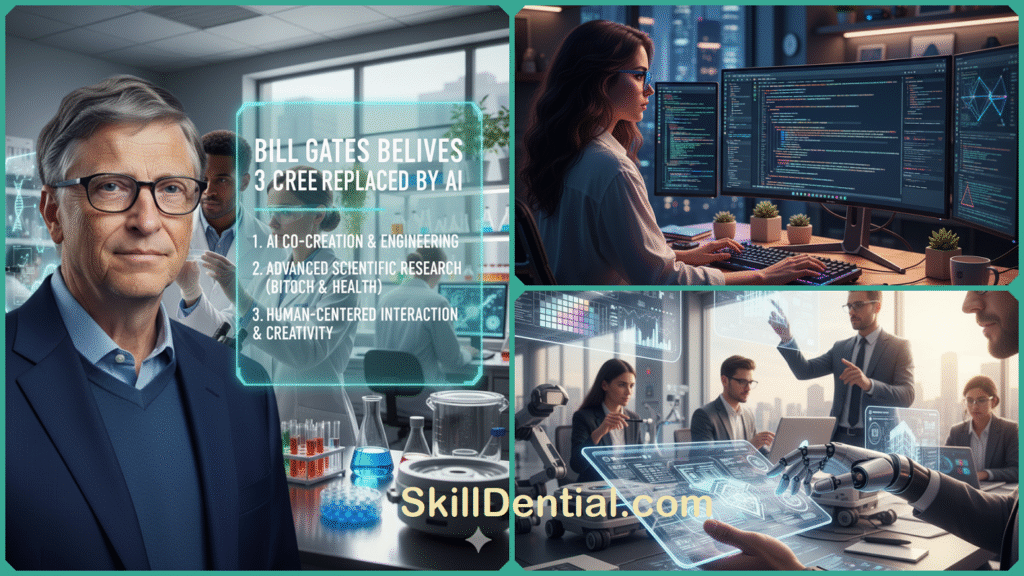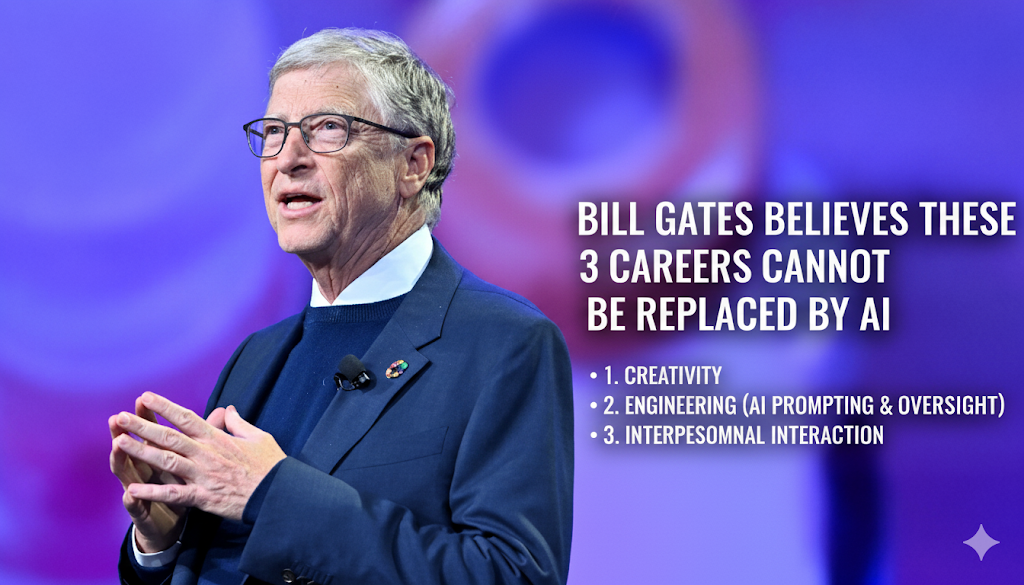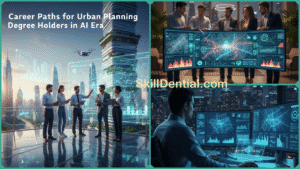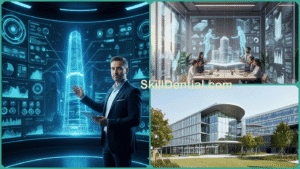The rapid advancement of artificial intelligence has ignited a worldwide debate, contrasting technological progress with the future of human employment. While many tech leaders caution about widespread job losses as AI automates tasks in various sectors, Bill Gates, Microsoft’s co-founder, presents an optimistic and precise perspective.
Gates contends that although AI will dramatically transform the workplace, three professions will remain irreplaceable because they demand uniquely human skills. According to Bill Gates, the future belongs to Coders (Programmers), Energy Experts, and Biologists.

This article will thoroughly explore his predictions, carefully exploring the unique and diverse requirements of these careers—from groundbreaking scientific intuition and innovative thinking to complex strategic decision-making and problem-solving—that collectively make them highly resilient and adaptable in an ever-changing world.
For students, professionals, and educators alike, Bill Gates’s framework provides an essential and thoroughly comprehensive roadmap that plays a vital role in helping them effectively align their skills and competencies with the rapidly evolving, complex, and ever-changing demands of the AI era.
This thoughtfully designed framework serves as an invaluable and crucial guide, enabling individuals to successfully navigate the numerous challenges and exciting opportunities presented by the continuous advancements in artificial intelligence technology.
The Three Careers Bill Gates Says AI Cannot Replace
The three careers that Bill Gates identifies as ones AI cannot replace—coders, energy experts, and biologists—continue to be essential because they depend heavily on uniquely human abilities such as creative intuition, a deep understanding of strategic complexity, and nuanced ethical judgment.
Bill Gates stresses that while AI will undoubtedly automate a wide range of routine tasks and fundamentally transform numerous industries, these particular professions require a level of human intellect, critical thinking, and careful oversight that AI, as it currently stands, is simply unable to replicate or fully substitute.
Coders: Architects of Tomorrow’s AI
Bill Gates emphasizes that coding is far more than simply writing lines of syntax; it encompasses the ability to identify hidden patterns, navigate intricate trade-offs, and apply creative problem-solving skills. Although AI tools like Copilot and ChatGPT provide valuable assistance with routine coding tasks and debugging, the crucial step of turning innovative ideas into fully functional and effective software ultimately relies on human creativity, intuition, and insight.
Furthermore, coders are not only users of AI systems but also their creators and ongoing maintainers, continually advancing and adapting technology to address emerging challenges and evolving threats. This dynamic, inventive aspect of programming guarantees that coders will remain indispensable and irreplaceable, even as artificial intelligence technology continues to progress rapidly.
Energy Experts: Guardians of Complex Systems
The energy sector encompasses the management of vast and highly intricate infrastructures spanning multiple sources, including oil, nuclear power, and renewable energy. Bill Gates contends that the inherently unpredictable nature of this sector, combined with its multifaceted and complex challenges, necessitates strategic human decision-making, deep ethical considerations, and effective crisis management—skills that remain beyond the current capabilities of AI.
Although artificial intelligence can significantly optimize data analysis and enhance operational efficiencies, energy professionals are uniquely equipped to navigate complex regulatory environments and address pressing sustainability challenges in ways that only humans can manage.
Their specialized expertise is absolutely critical for maintaining stable, reliable, and resilient energy systems, especially in the face of growing global demands and urgent environmental imperatives.
Biologists: Explorers of Life’s Mysteries
Biologists, particularly those working within the fields of medicine and scientific research, rely extensively on a combination of creative intuition, critical thinking skills, and a strong sense of ethical judgment.
While artificial intelligence is capable of processing enormous amounts of data quickly and can be extremely helpful in assisting with tasks such as diagnosing diseases, it fundamentally lacks the capacity to make imaginative conceptual leaps or develop innovative, groundbreaking hypotheses that are crucial for real scientific progress and advancement.
Bill Gates holds the view that human biologists will remain at the forefront of making significant discoveries in areas like genetics, understanding diseases, and the broader life sciences, with AI playing the role of a powerful assistant that supports their work rather than serving as a complete replacement for human expertise and insight.
These roles remain resilient against AI replacement because they demand skills and qualities that are uniquely human and cannot be easily replicated by artificial intelligence or automated systems.
- Creative Intuition is a unique skill possessed by both coders and biologists, allowing them to push the boundaries of innovation far beyond the limitations of standard algorithms. This ability fosters groundbreaking ideas and solutions that transcend conventional computational methods.
- Strategic Complexity refers to the intricate challenges faced by energy experts, requiring them to engage in multifaceted planning and demonstrate strong leadership skills amid ever-present uncertainty. This complexity demands a deep understanding of various interconnected factors and the ability to adapt strategies dynamically as situations evolve.
- Ethical Oversight plays an absolutely crucial role in all these diverse fields, as it ensures that decisions made are morally sound and responsible. This oversight is essential for guiding actions that have significant impacts on both society and the environment, helping to uphold ethical standards and protect the well-being of communities and natural ecosystems alike.
Bill Gates’s insight reflects a future where AI amplifies human capability rather than replaces it. Professionals who combine domain expertise with AI literacy will thrive by using AI as a tool to tackle complex problems requiring human judgment and creativity. This perspective offers hopeful guidance for students choosing career paths, professionals evolving their skills, educators advising future generations, and tech enthusiasts analyzing AI’s societal impact.
To remain highly competitive in the ever-evolving job market, individuals should actively cultivate and develop uniquely human traits such as creativity, empathy, critical thinking, and emotional intelligence, alongside acquiring strong AI-related skills and competencies.
By combining these distinctly human qualities with technical expertise in artificial intelligence, they can position themselves as indispensable and valuable contributors in these resilient and future-proof fields. This balanced approach will not only enhance their professional relevance but also ensure they stand out in an increasingly automated world.
Current Trends and Developments
Current trends and recent developments in artificial intelligence highlight a swiftly advancing technology that is significantly transforming a wide range of industries. At the same time, these advancements emphasize and reinforce the essential complementary role that humans continue to play in tackling complex problem-solving tasks.
AI models, including OpenAI’s advanced language systems, excel in tasks like natural language understanding and medical diagnostics, demonstrating capabilities that once seemed decades away. However, despite these breakthroughs, AI is widely regarded as an augmentation tool rather than a replacement for tasks requiring deep, creative human insight.
Microsoft AI CEO Mustafa Suleyman, alongside Bill Gates, has expressed that AI will reshape work profoundly, but many jobs inherently demand adaptable, creative humans. This includes roles that require strategic thinking, emotional intelligence, and ethical judgment, traits AI currently lacks.
One clear trend is that AI is set to automate routine and repetitive entry-level tasks, which is increasing the demand for higher-level skills in professions that AI cannot fully replicate—such as coders, energy experts, and biologists, as Bill Gates has noted.
Professionals in these fields are increasingly integrating AI tools to enhance productivity, optimize resource use, and analyze complex data sets, further highlighting AI’s role as a collaborator rather than a substitute.
This integration is driving a new model of AI-human partnership where AI handles data-heavy or procedural components, allowing humans to focus on creative problem-solving, strategic decision-making, and ethical considerations. This complementary approach is shaping future career resilience and underscores the importance of continuous skill development centered on uniquely human capabilities.
In Summary
The evolution of AI is progressing at a pace much faster than originally anticipated, compelling various industries to rapidly adjust and innovate in response to these technological advancements. This swift acceleration not only highlights the transformative power of AI but also reaffirms the crucial role that human ingenuity, creativity, and ethical oversight continue to play in shaping a future that is driven by technology.
Without these uniquely human qualities, it would be impossible to guarantee the responsible and beneficial development of AI in a way that truly serves society. These essential human traits are crucial for guiding AI progress to ensure it aligns with ethical standards and positive outcomes for all.
Practical Advice for Each Audience Segment from Bill Gates
Practical advice from Bill Gates for various audience segments regarding AI-resistant careers emphasizes the importance of blending core human skills with AI literacy and adaptability for future resilience. He highlights that developing a strong foundation in uniquely human abilities such as creativity, critical thinking, and emotional intelligence, combined with an understanding of how AI tools operate and can be leveraged, will be essential for individuals aiming to thrive in the evolving job market.

Bill Gates encourages people to continuously update their skills, embrace lifelong learning, and remain flexible to adapt to technological advancements to ensure long-term career stability and success in an AI-driven world.
- Students & Career Starters: Students should concentrate on STEM fields—computer science, energy engineering, and biology—where creativity and problem-solving remain invaluable. Taking courses that include AI tools and concepts enhances competitiveness. Bill Gates suggests developing AI complementary skills because while AI aids with routine tasks, human ingenuity drives innovation and complex decision-making. Staying curious and continuously learning new technologies will help students secure stable, future-proof careers.
- Current Professionals: Professionals can remain relevant by upskilling to integrate AI literacy into their everyday work. Coders should specialize in designing and managing AI systems since AI-generated code needs human oversight and creative input. Energy experts can harness AI for data-driven analytics, predictive maintenance, and sustainable planning. Biologists can use AI to accelerate research, but must maintain creative and ethical judgment. Lifelong learning and adaptability are key to thriving amid ongoing AI evolution.
- Parents & Educators: Guidance for young learners should focus on developing critical thinking, creativity, ethical reasoning, and interdisciplinary skills. Preparing students for AI-human hybrid workplaces means emphasizing human intuition supported by technological tools. Encouraging exploration in AI-augmented professions and fostering innovation will better equip the next generation for future challenges.
- Tech/Business Enthusiasts: For this group, following AI advancements and how humans augment AI-driven processes is crucial. Investing strategically in AI-augmented fields like programming, energy management, and biological research offers long-term value. Bill Gates’s insights serve as a reminder to critically evaluate AI’s capabilities and limits while appreciating the indispensable role of human creativity and ethical oversight in technology’s future.
This multi-faceted advice reinforces the importance of leveraging AI as a powerful tool while cultivating human-centric skills that AI cannot replace, guiding individuals across demographics to thrive in the evolving job landscape. Bill Gates offers practical advice tailored to distinct audience segments to help navigate the evolving landscape shaped by AI, focusing on careers resilient to automation.
- Students & Career Starters: Students should focus on STEM fields—computer science, energy engineering, and biology—where creativity and problem-solving are crucial. Taking courses that integrate AI literacy and tools bolsters future job security. Emphasizing continuous learning and adaptability equips students to leverage AI as a complementary tool, ensuring career stability in a rapidly transforming job market.
- Current Professionals: For those already working, upskilling by incorporating AI literacy is vital. Coders can specialize in AI system design and management, energy experts can utilize AI-driven analytics for sustainable decision-making, and biologists can enhance research with AI assistance while maintaining critical thinking and ethical oversight. Embracing lifelong learning and flexibility helps professionals stay relevant amid AI’s evolution.
- Parents & Educators: Parents and educators should encourage young people to develop critical thinking, creativity, ethical judgment, and interdisciplinary skills that blend human intuition with technology. Preparing learners for hybrid AI-human workplaces means fostering innovation and adaptability, ensuring they thrive in future careers influenced by AI advancements.
- Tech/Business Enthusiasts: Tech and business enthusiasts are advised to closely track AI advancements and the integration of human skills with AI tools. Strategic investment and innovation focus should be on AI-augmented professions like coding, energy management, and biological sciences. Bill Gates’s insights emphasize understanding AI’s limits and valuing human creativity and ethics as key to succeeding in a tech-driven economy.
This comprehensive guidance firmly reinforces the idea that thriving in the rapidly evolving AI era requires a strategic combination of uniquely human skills alongside a strong foundation in AI literacy.
By integrating these essential capabilities, individuals across all professional segments and industries are better positioned to achieve long-term career resilience and sustained growth opportunities in an increasingly technology-driven world.
FAQs
Why will coders not be replaced by AI?
Coding involves a significant amount of creativity, intricate pattern recognition, and complex decision-making processes that artificial intelligence still cannot fully replicate or replace. Humans do much more than just write code; they also build, debug, maintain, and continuously evolve AI systems. These tasks require a combination of critical thinking, intuition, and problem-solving abilities that remain uniquely human and essential in the development and advancement of technology.
How do energy experts benefit from AI?
AI plays a crucial role by thoroughly analyzing vast amounts of data and significantly optimizing operational efficiencies. However, effectively managing the complexities of the energy sector—including handling crises, driving sustainability initiatives, and navigating intricate regulatory challenges—demands the application of human strategic insight combined with thoughtful ethical judgment.
Can AI replace biologists in medical discovery?
Artificial intelligence can analyze and process vast amounts of data quickly and efficiently, which makes it highly valuable in assisting with diagnostics and identifying patterns within large datasets. However, despite these strengths, AI still lacks the creative intuition and the nuanced ethical judgment that are essential for driving significant scientific breakthroughs, particularly in complex fields like biology and medicine, where human insight and moral considerations play a crucial role in advancing knowledge and developing innovative treatments.
What skills should I develop to future-proof my career?
Developing strong skills in creative problem-solving, strategic thinking, ethical reasoning, and AI literacy that are specifically relevant to your field will significantly help you future-proof your career and maintain a competitive edge amidst the rapid and ongoing advances in artificial intelligence technologies.
How can professionals embrace AI without losing their jobs?
Professionals should actively use AI as a valuable tool to significantly enhance their productivity, foster innovation, and effectively solve complex problems that demand human judgment, intuition, and creativity. They must focus on ensuring their skills and expertise complement AI technologies, working alongside them rather than competing against or being replaced by artificial intelligence systems.
In Conclusion
Bill Gates’s identification of coders, energy experts, and biologists as careers safe from AI replacement highlights the enduring value of uniquely human capabilities such as creativity, strategic complexity, and ethical oversight. His perspective offers reassurance amid concerns about AI disrupting the workforce by emphasizing that these professions rely on skills machines cannot replicate.
For those anxious about the future, Gates’s insight provides a hopeful roadmap: embrace AI as an empowering tool, cultivate skills that AI cannot mimic, and continue to innovate at the intersection of humanity and technology. As AI reshapes industries and transforms workplaces, these careers remain vital pillars of a future where human insight leads progress.
In a rapidly evolving job market, success will come to those who combine domain expertise with AI literacy and adaptability. Bill Gates encourages professionals and learners to view AI not as a threat, but as a powerful collaborator that enhances human creativity and problem-solving.
Ultimately, this vision underscores the important idea that although AI will dramatically transform and revolutionize a wide range of tasks and processes, the essential human roles involved in designing, managing, and ethically guiding these advanced technologies will continue to be absolutely indispensable and crucial for the foreseeable future and beyond.
Discover more from SkillDential
Subscribe to get the latest posts sent to your email.


